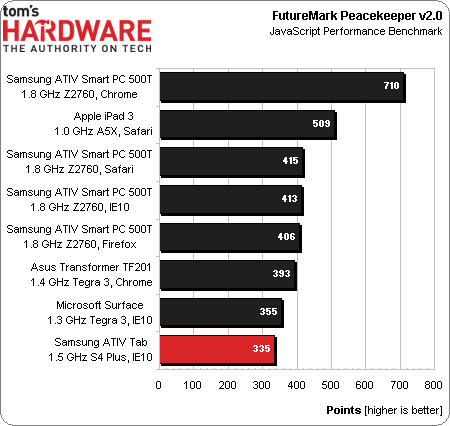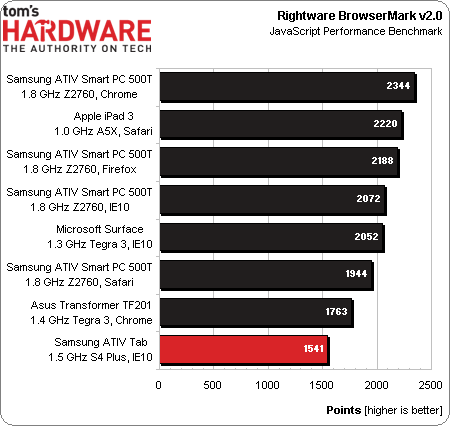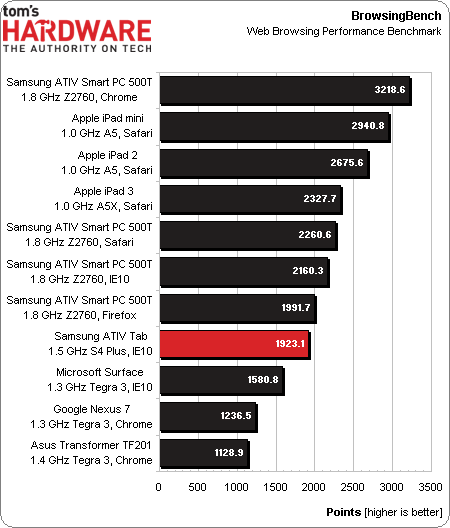Samsung ATIV Tab Review: A Tablet To Hold Your Breath For?
Performance: Web Browsing Tests
As the tablet space becomes increasingly crowded, we're more interested than ever in comparing the performance of iOS-, Android-, Windows RT-, and Windows 8-based platforms. That's not easy, since both Microsoft and Apple are pretty restrictive about the software that runs under their respective mobile operating systems.
In fact, there aren't any cross-platform benchmarks available for Windows RT. Browser-based tests are the only way we're able to compare Samsung's ATIV Tab to other devices. Of course, these metrics aren't the last word on performance. Browser support varies by operating system, and we already know that, even on a consistent platform, each rendering engine's performance is different.
So, when you consider the many different tablets we're comparing, along with the permutations of software available for them, these numbers are affected by several variables. Fortunately, Windows 8 lets us test IE10, Chrome, and Safari, creating approximate parallels to other hardware with those same browsers.
Just as we did in the Web Browser Grand Prix, we're retiring the JavaScript-focused SunSpider, Octane, and V8 benchmarks in favor of Futuremark's Peacekeeper and Rightware's BrowserMark 2.0.
Both tests indicate that the Intel Atom SoC under Windows 8 (in Samsung's ATIV Smart PC 500T) is ~30% faster than Nvidia's Tegra 3 with Windows RT, both running on IE10.
The APQ8060A and Windows RT combination in Samsung's ATIV Tab is slower than the Surface's Tegra 3. We saw the opposite in Snapdragon S4 Pro: Krait And Adreno 320, Benchmarked, though that could be a result of Qualcomm's development platform employing a quad-core SoC running at 1.7 GHz.
Peacekeeper and BrowserMark are useful tools in their own right. At their core, though, they're designed to measure JavaScript performance. They don't necessarily reflect how quickly a webpage renders in a real-world setting. That's why we like BrowsingBench. It evaluates the total performance of a browser: page loading, processing, rendering, compositing, and so on. This more accurately demonstrates the performance difference between two devices in a way you'd actually see.
Get Tom's Hardware's best news and in-depth reviews, straight to your inbox.
Samsung's ATIV Smart PC 500T continues illustrating why an open ecosystem is a good thing for developers and users alike, as Chrome on Windows 8 finishes in first place.
The ATIV Tab fares better this time around, edging out Microsoft's Surface and landing just behind the Atom Z2760-powered ATIV Smart PC 500T running Firefox. If you want a better experience from the 500T, though, install Chrome.
Current page: Performance: Web Browsing Tests
Prev Page Samsung ATIV Tab: Another Windows RT-Based Contender Next Page Performance: Samsung's 10.1" LCD Display-
kyuuketsuki ReplyWhile we were at CES, however, we met up with Lazslo Kishonti, CEO of Kishonti Informatics and the developer of GLBenchmark. He pointed out that Atom-based tablets running Windows RT are more likely to deliver different levels of performance.
Er, you mean Atom-based tablets running Windows 8? (Page 6, Paragraph 11)Power consumption graphs says this tablet has Z2760.Our setup is pretty basic: we set BrowsingBench to run in battery life mode, which prevents the browser from caching data. Instead of
Where's the rest of this paragraph? (Page 6, Paragraph 13) -
kyuuketsuki Also, I'm not sure what's up with the Futuremark Peacekeeper and Rightware Browsermark results, but we know damn well the Krait S4 in this tab is a better performer in every way to the Tegra 3. Not sure why go with the S4 Play with the dual-core Krait and Adreno 225 instead of an S4 Pro with quad-core Krait and Adreno 320, though, especially in a tablet form-factor.Reply -
mayankleoboy1 KyuuketsukiNot sure why go with the S4 Play with the dual-core Krait and Adreno 225 instead of an S4 Pro with quad-core Krait and Adreno 320, though, especially in a tablet form-factor.Because Win8 is already a battery hog compared to Android, and adding power hungry cores will make that worse.Reply
I dont see any issues with S4 pro and Android. -
cangelini KyuuketsukiEr, you mean Atom-based tablets running Windows 8? (Page 6, Paragraph 11)Where's the rest of this paragraph? (Page 6, Paragraph 13)Fixed!Reply -
dokterprio Why there is difference in power usage between ativ tab and ativ smartpc 500t. I think they are the same, except the screen size.Reply -
adamovera dokterprioWhy there is difference in power usage between ativ tab and ativ smartpc 500t. I think they are the same, except the screen size.Sorry, we had the charts labelled the same. The ATIV Smart PC 500T has an Atom and runs Windows 8, while the ATIV Tab has an ARM-based chip from Qualcomm and runs Windows RT - they are actually very different devices.Reply -
adamovera ojasBrowsingBench scores: are the ipads in correct order?Seems to be, I haven't used this benchmark yet myself, and I'd have to check with the author to be sure, but I'd guess that these results are inversely reflecting the resolution of the different iPads.Reply


